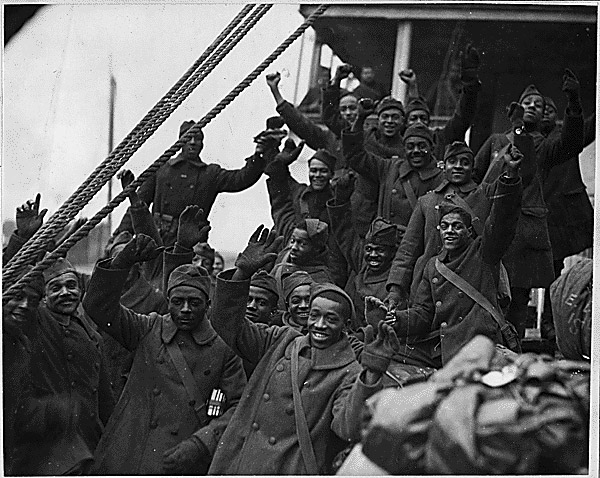Honoring All Our WWI Heroes – 369 Harlem’s Hellfigthers

President Obama and Vice President Biden this week paid an unannounced visit to Arlington National Cemetery. They went there to offer the thanks of a grateful nation for the service of Frank Buckles, the last known survivor of the American “Doughboys” of World War I. Buckles was barely 16 when he fibbed about his age to get into uniform.
It is altogether fitting and proper that they should do this.
That Great War was America’s baptism by fire on the world scene. Although France and Britain, Canada, Australia, and New Zealand had already been fighting in Flanders field and Northeast France for three long, bloody years when the U.S. came into the war against Germany, the Americans were welcomed most heartily, especially by the exhausted French.
President Woodrow Wilson said America wanted “to make the world safe for democracy.” It was a noble cause. But it was certainly an odd thing to ask America ‘s black soldiers to fight for. After all, this was the era of KKK lynchings in many states of the Union. This was the time when Jim Crow laws forced black Americans into second class citizenship in the land of their birth. This was an age when the voting rights guaranteed by the Fifteenth and Nineteenth Amendments to the Constitution were routinely denied in thousands of polling stations.
Wilson denied urgent appeals from French generals to have soldiers of the American Expeditionary Force (A.E.F.) fill in the gaps in their lines. As a commander-in-chief with no military experience or interests, he followed the wise counsel of our commanding general, John Pershing, that American soldiers should fight as a unit — and only under American officers. Pershing even rejected French army trainers. “An American army cannot be made by Frenchman,” he said.
Wilson did make one exception, however. He did allow units like New York ‘s 369th Regiment — the all-black “Harlem Hellfighters” — to serve under the French. Although in doing this Wilson may have been treating his black soldiers not like sons, but like stepsons, the Harlem Hellfighters actually welcomed the chance to get into action early and prove their mettle.
And prove it they did. The Harlem Hellfighters enjoyed their reception into the French forces. Wilson ‘s feckless administration had left the U.S. Army and Navy woefully unprepared for war, but the French shared with the Harlem Hellfighters their warm winter uniforms, boots, and even their distinctive, more protective steel helmets.
Our men from Harlem and other black units — then called colored troops — appreciated France ‘s genuine commitment to racial equality. Wounded soldiers of France — the whites and those from France ‘s African colonies — were treated by devoted nurses in integrated hospitals. This honor was automatically extended to America ‘s black soldiers wounded in defense of France.
Not all Americans on the home front agreed with segregation of military units, or with policies that treated black Doughboys differently than others serving the cause of freedom.
Former President Theodore Roosevelt, that old Roughrider, was committed to civil rights. And he wanted to fight for freedom. He went hat-in-hand to the White House to plead with Wilson to let him serve in the trenches. But you might be killed there, Wilson rejoined. I would be more than content, the fearless TR said, to have on my tombstone “Roosevelt to France.”
TR suspected that Wilson’s real reason for denying his plea was fear that Roosevelt would distinguish himself once again in battle and defeat Wilson in the 1920 presidential election. Embittered by this refusal, Roosevelt stepped up his vocal criticisms of Wilson ‘s hapless administration — and complained of unfair treatment of America ‘s black soldiers.
The Harlem Hellfighters were too busy fighting Germans to pay much attention to political wrangles at home. Grateful France showered medals on the brave black soldiers who came to her rescue. The officers and enlisted men of 369th Regiment were awared 170 Croix de Guerre and the Legions d’Honneur. Just six weeks before the Armistice, Cpl. Freddie Stowers of the 371st Regiment led an attack against a German machine nest at Maison-en-Champagne. The Germans surrendered, but soon jumped back into their trenches. Eddie Stowers pursued them, knocked out one nest, and summoned his men to follow him. But he was shortly cut down by another bullet. His men followed his lead, however, and took the hill where Eddie Stowers fell. Cpl. Stowers was the only black soldier in World War I to win the Congressional Medal of Honor, awarded posthumously.
When the Harlem Hellfighters returned to New York after their great victory, tens of thousands turned out to greet them. They marched smartly up Manhattan ‘s Fifth Avenue, cheered by all races. Their great regimental band leader, James Reese Europe, led them into Harlem, where he switched from martial music to jazzier tunes. The overflowing crowds — wives, sons and daughters of these black heroes — whooped in delight when Big Jim Europe’s band played “Here Comes My Daddy.”
There never should have been segregated units in the armies of this great republic. We can be thankful to President Harry Truman, another World War I Doughboy, for integrating our armed forces in 1948. But as Frank Buckles is laid to rest, we can be also be proud of Harlem’s Hellfighters and remember their brave defense of freedom.
By Ken Blackwell (Archive) · Saturday, March 19, 2011